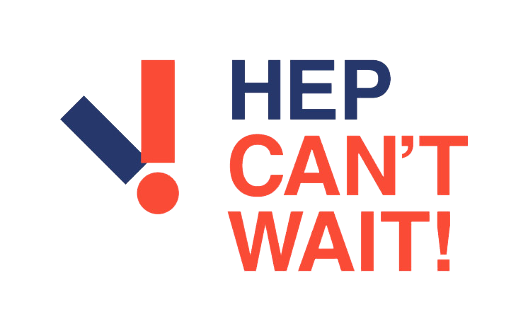Hepatitis Can’t Wait is this theme of this year’s recognition of World Hepatitis Day. To promote this important world-wide health concern, the following features scholarship, research, and service being conducted by two faculty members in the UGA College of Pharmacy – Dr. David Chu, Distinguished Research Professor Emeritus, and Dr. Brian Seagraves, Clinical Academic Professional Associate in the CAP Department. Appreciation is extended to Dr. Uma Singh, Research Assistant Professor in the Drug Discovery Group and Dr. Seagraves, who prepared these articles, and to the students, who shared their stories.
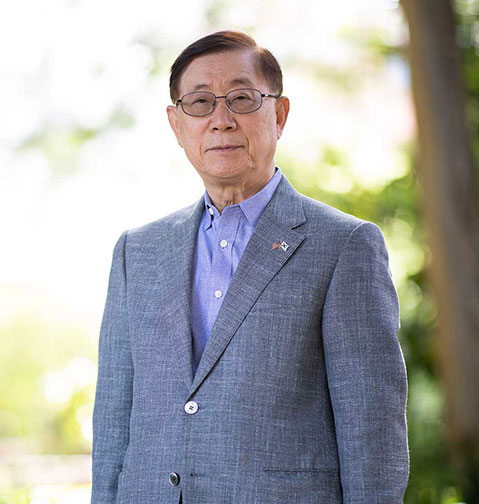 Dr. Chu Is Trailblazer in Hepatitis Drug Discovery
Dr. Chu Is Trailblazer in Hepatitis Drug Discovery
As a Distinguished Research Professor Emeritus in CoP’s Department of Pharmaceutical and Biomedical Sciences, Dr. C.-K. David Chu has established an internationally-recognized academic drug discovery program for antiviral research. Specifically, Dr. Chu’s lab has made remarkable contributions in the discovery of antiviral agents for the treatment of hepatitis. His group discovered Clevudine, an anti-hepatitis B virus (HBV) drug. Marketed under the trade names of Levovir and Revovir, it is being used to treat chronic hepatitis B infections in Asian countries and has saved the lives of millions of people. Currently, drug resistance is a significant concern for hepatitis patients who are being treated with FDA-approved drugs. Dr. Chu’s research group recently discovered FMCAP, a preclinical candidate for drug-resistant hepatitis B virus (HBV). This molecule has efficacy against the drug-resistant HBV, and preclinical studies of FMCAP are under trial. Due to his contribution to the treatment of hepatitis and other viral diseases, Dr. Chu has been honored by many prestigious international awards in antiviral drug discovery fields; John A. Montgomery Award (The International RoundTable Society), Antonin Holy Award (Society of International Antiviral Research). He is an elected Fellow of National Academy of Inventors & American Association of Advancement of Science. In addition, he is a recipient of the NIH Merit Award and Inventor of the Year Award of UGA. Dr. Chu has published more than 320 peer-reviewed research papers and received 65 U.S. patents. Kudos to Dr. Chu and his team!
World Hepatitis Day takes place every year on July 28 and brings the world together under a single theme to raise awareness of the global burden of viral hepatitis as well as to influence real change. This year’s theme is Hepatitis Can’t Wait.
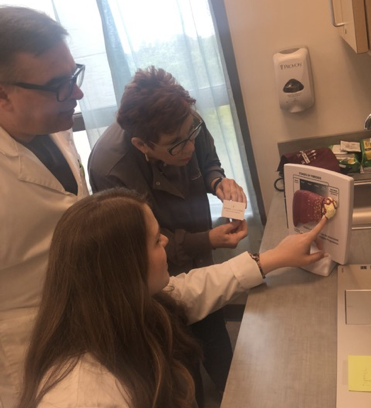
From front to back: Dr. Morgan Moulton, PGY2; Dr. Brian Seagraves; and Paige Cummings, Executive Director of the Athens Nurses’ Clinic. Dr. Moulton is describing hepatocellular carcinoma using an anatomic model of the human liver.
Hepatitis C is a viral infection of the liver. The hep C virus is transmitted via blood to blood only. Left unchecked, the hep C virus can scar the liver leading to cirrhosis, liver cancer, and death. The World Health Organization estimates that 71 million people worldwide are chronically infected with hepatitis C and that one person dies from hepatitis every 30 seconds. The Centers for Disease Control estimates that 2.4 million people in the U.S. are chronically infected.
Unfortunately, hep C is insidious in the early stages of the infection. Detection and treatment of those infected as well as educating the public are the keys to the eradication of this virus.
Early in his career, Dr. Brian Seagraves, CoP Clinical Academic Professional Associate, observed the impact of this disease in the Athens and surrounding communities. He also recognized how this disease seems to disproportionally affect the disenfranchised citizens of these communities. So, he set out to do something about it. He spent countless hours researching the hepatitis viruses (A-E), the pathophysiology of the diseases, and the therapies. He then established a hepatitis treatment clinic initially at Mercy Health Center and then later at the Athens Nurses’ Clinic.
In 2018, realizing that detection of hep C in the community was paramount, Dr. Seagraves focused his efforts on the Athens Nurses’ Clinic due to their community screenings and outreach that were already established. With help from the local Georgia Department of Public Health, Dr. Seagraves added hep C screening tests to the Nurses’ Clinics’ community outreach program. He also consulted with and aided free clinics inside and outside of the Athens community to establish their own hepatitis screening and treatment programs.
As an educator, Dr. Seagraves began taking pharmacy residents and pharmacy students to the clinic as a way of training the next generation of pharmacists in the detection and treatment of the hepatitis disease as well as to teach them how to be sensitive and all-inclusive with patients. The following highlights some of these residents’ and students’ experiences at the Athens Nurses’ Clinic’s Hepatitis Treatment program.
Morgan Moulton, PharmD, PGY2 Athens
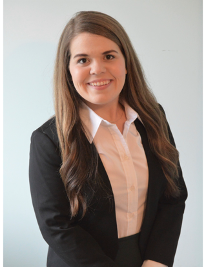 After obtaining my Doctor of Pharmacy degree, I pursued PGY1 residency at the Tuscaloosa VA Medical Center. During my second year of training, I achieved certification as a Board-Certified Pharmacotherapy Specialist through the Board of Pharmacy Specialties. At Athens Nurses Clinic my role is to assist in Hepatitis C Virus (HCV) drug therapy selection and medication education in the Infectious Disease Clinic. Prior to this experience, I had very little exposure to treating patients with HCV. To prepare, I focused on reviewing the American Association for the Study of Liver Disease Guidelines for the Testing, Managing, and Treating HCV.
After obtaining my Doctor of Pharmacy degree, I pursued PGY1 residency at the Tuscaloosa VA Medical Center. During my second year of training, I achieved certification as a Board-Certified Pharmacotherapy Specialist through the Board of Pharmacy Specialties. At Athens Nurses Clinic my role is to assist in Hepatitis C Virus (HCV) drug therapy selection and medication education in the Infectious Disease Clinic. Prior to this experience, I had very little exposure to treating patients with HCV. To prepare, I focused on reviewing the American Association for the Study of Liver Disease Guidelines for the Testing, Managing, and Treating HCV.
This population of patients is completely uninsured. If it were not for the Athens Nurses Clinic, these patients would likely not have access to health care. Patients with HCV often contract it through IV drug use or tattoos with a non-sterile needle. These patients also tend to have several social barriers that may complicate treatment, such as homelessness, substance abuse, or pending criminal charges. Because these can be sensitive topics, we often have to be mindful that the patient may have additional needs other than HCV treatment when completing patient interviews. Despite many challenges in life, this patient population is so appreciative of the treatment they receive at Athens Nurses Clinic and it is a pleasure to be a part of their HCV treatment. From this experience, I have learned how to properly assess a patient’s past medical history, current medications, HCV genotype, liver fibroscan, and lab values to recommend safe and effective HCV medication regimen. I also have developed skills in patient education for a wide variety of HCV medications. I have been able to play a role in follow-up appointments and lab work. I also have learned how to recognize and treat side effects of HCV medications.
The health care professionals at Athens Nurses Clinic are excellent to work alongside and welcomed me onto the team immediately. They are very appreciative of pharmacy service and utilize us highly in the care of patients. I am often consulted for drug information questions along with drug dosing, side effects, and treatment recommendations for a wide variety of disease states.
A particular patient who has made an impact on me is a woman at the clinic who I met for the first time for HCV medication counseling at the beginning of her treatment. She told me over and over again how excited she was to get started with the medication! I went through my standard interview questions. “How do you believe you got HCV?” She replied it was most likely through IV drug use. She was beaming when she told me she was almost done with her rehabilitation program for substance abuse and that she was 10 months sober. She told me about her daughter who she could not wait to get home to and all the hopes and dreams she had for her future now that she has her life back on track. She told so many inspiring stories about how she thought she was beyond repair, but now she has hope. She credits Athens Nurses Clinic for giving her the hope for a cure for HCV. We credit her for reminding us why we love serving the people of Athens.
My time at Athens Nurses Clinic has taught me so much about investing in the people where you live and work. I have learned how important it is to care for your patients with respect, compassion, and empathy. I am very thankful to have had this experience as a pharmacy resident and I know it will only strengthen me as a practitioner moving forward in my career.
Tierra Jackson, Third Year PharmD Student, UGA
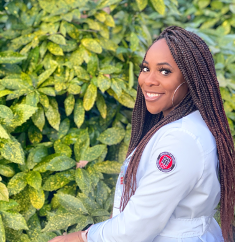 As an undergraduate student in the B.S program three years ago, I took the hep C elective with Dr. Seagraves. As a P2 in the PharmD program, I took the elective again to gain more clinical insight.
As an undergraduate student in the B.S program three years ago, I took the hep C elective with Dr. Seagraves. As a P2 in the PharmD program, I took the elective again to gain more clinical insight.
After meeting Dr. Seagraves at Mercy Health Center in 2018, I loved what he was doing with the hep C clinic. I saw first-hand how the services he provided gave members of the community a second chance at health that they could never have received otherwise. I knew I wanted to be involved, so I took the research elective as an undergrad. It was my first insight into the clinical side of pharmacy. It was the perfect way to merge my passion for service with my interest in pharmacy. As a P2 student, I knew I wanted to be a part of the clinic once again. At the clinic, we helped patients that everyone else would avoid. There were homeless, drug addicts, and ex-convicted felons, but they were all there because they had a desire to make a change for the better. They wanted to take control of their health. When starting over, it’s easy for people to overlook and pass judgment, but the clinic provided a safe space for these patients to begin correcting their steps. Working for Kroger Pharmacy, I’ve seen many different patients come in and out. The differences between them and the patients at the clinic are that the hep C patients needed a bit more support. The experience taught me so much about patient advocacy and patient education. As some may know, medications needed to treat hep C are extremely expensive and often unobtainable for the population who needs them the most. Through this elective, I learned how I can seek equitable resources for my patients. The services also allowed us to rebuild trust between healthcare professionals and an indigent patient population. We had the opportunity to be support systems in their journey to rehabilitation. We also were able to educate them on their healthcare and address preventative measures. All of these lessons and more, are definitely practices that I will take with me throughout the rest of pharmacy school and in my career as pharmacist. The interdisciplinary team that supported the clinic was amazing. Everyone respected each other’s role, and we all worked in the best interest of the patients. I believe that the collaborative efforts made the patients feel even more supported. They knew that we all wanted the best for them. The roundtable discussions allowed me to hear the decision-making process from many different perspectives. The College of Pharmacy stresses whole-patient care, and incorporating dieticians, nursing, spiritual care with pharmacy was a great depiction of this.
Brittany Brooks, Fourth Year PharmD Student, UGA
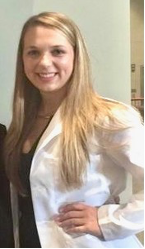 When I was in my first three years of pharmacy school, I was based in Athens with Dr. Seagraves. In the beginning, there was not a hepatitis elective. It was something that some of us students did as an extracurricular activity on Wednesday mornings and Wednesday afternoons around our class schedules. When Dr. Seagraves made the hepatitis elective an option, I jumped at the opportunity to do something I enjoyed and to get class credit. Being in clinic, this group of people really opened my eyes to how an open mind can affect treatment in a positive way for patients. I loved how unbiased the nurses and Dr. Seagraves were to everyone who walked through the door to get treatment or get tested. Everyone was listened to with open ears and, on occasion, open arms when results were not what the patient was hoping for. Many of the patients were homeless or in addiction treatment centers, and they opened my eyes to finding positivity in everything. Their disposition and motivation to improve their lives was evident in every visit and conversation that we had. It made me want to stay positive throughout my day and to look for the bright side of things with every situation I was in. I have adapted that philosophy into my own life and work daily to find the optimistic side of things. My favorite part of the hep C clinic was getting to go out to the addiction treatment centers or health fairs and to test people for hep C. The people I met on those outings were eager to learn about hep C and how to keep from getting it while also asking other questions about their health. If we hadn’t been there, they might not have tried seeking the answers potentially causing health problems or ER visits in the future. Dr. Seagraves taught me so much throughout my three years with him at Athens Nurses’ Clinic. I improved my clinical thinking skills and learned the impact of treating patients holistically, not just the disease state they are present for. He reinforced the need to get to know your patients, so they see you as a confidant rather than just a “manager of medications.” Often, he and the nurses would go to patients’ addiction program graduations and cheer them on. This clinic and the staff showed me the importance of enjoying your job and how that can change your attitude on everything.
When I was in my first three years of pharmacy school, I was based in Athens with Dr. Seagraves. In the beginning, there was not a hepatitis elective. It was something that some of us students did as an extracurricular activity on Wednesday mornings and Wednesday afternoons around our class schedules. When Dr. Seagraves made the hepatitis elective an option, I jumped at the opportunity to do something I enjoyed and to get class credit. Being in clinic, this group of people really opened my eyes to how an open mind can affect treatment in a positive way for patients. I loved how unbiased the nurses and Dr. Seagraves were to everyone who walked through the door to get treatment or get tested. Everyone was listened to with open ears and, on occasion, open arms when results were not what the patient was hoping for. Many of the patients were homeless or in addiction treatment centers, and they opened my eyes to finding positivity in everything. Their disposition and motivation to improve their lives was evident in every visit and conversation that we had. It made me want to stay positive throughout my day and to look for the bright side of things with every situation I was in. I have adapted that philosophy into my own life and work daily to find the optimistic side of things. My favorite part of the hep C clinic was getting to go out to the addiction treatment centers or health fairs and to test people for hep C. The people I met on those outings were eager to learn about hep C and how to keep from getting it while also asking other questions about their health. If we hadn’t been there, they might not have tried seeking the answers potentially causing health problems or ER visits in the future. Dr. Seagraves taught me so much throughout my three years with him at Athens Nurses’ Clinic. I improved my clinical thinking skills and learned the impact of treating patients holistically, not just the disease state they are present for. He reinforced the need to get to know your patients, so they see you as a confidant rather than just a “manager of medications.” Often, he and the nurses would go to patients’ addiction program graduations and cheer them on. This clinic and the staff showed me the importance of enjoying your job and how that can change your attitude on everything.
Working alongside nurses, nursing students, other pharmacy students, and even with pharmaceutical company representatives was amazing. I learned so much from the two hep C nurse practitioners, Janna and Stephanie, while getting to interact with the various nursing students that helped with patient intake. The interprofessional collaboration within the practice runs smoothly, and everyone works together to get patients what they need, even if it is a dental appointment within the practice on another day. Throughout my three years at the clinic, there were so many patients that I looked forward to seeing each week. Some of them were because I enjoyed seeing their progress throughout the treatment while others were a delight to talk to and hear stories from. A favorite was a man who came to us with both hep C and hep B, who was feeling tired and had a yellowness to his complexion indicating that his liver was damaged. Throughout his treatment, I could see the improvements he made with his energy and skin tone. By the end of treatment, it was night and day in comparing his personality and energy level to when he first arrived. That visible change in his demeanor propelled my drive to help patients improve their health and eradicate this virus from the community. No matter what avenue of pharmacy I end up in, I will always remember the experiences, life lessons, and education I got from my three years at Athens Nurses’ Clinic with Dr. Seagraves. I hope that those lessons will make me not only a better clinician and pharmacist but also a better person in everything I do.
Veli Uzunova, Third Year PharmD Student, UGA
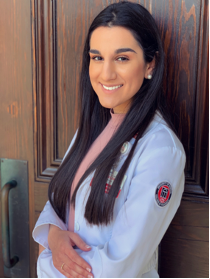 During the spring semester of my P2 year, I took the hepatitis clinic elective at Athens Nurses’ Clinic. I decided to take the elective because of my interest in infectious diseases. The experiences I had at the clinic were so valuable to me. I had the opportunity to be directly involved in patient care while working under Dr. Seagraves. As a pharmacy student, my role consisted of providing disease state education, medication counseling, and conducting hepatitis screening in various settings. During my time at the clinic, I improved on my ability to collect patient information, assess past medical history and make drug recommendations based on HCV genotype and patient-specific factors. I learned a lot from working alongside the nurse practitioners at the clinic. While working up patients with them, I expanded my knowledge of viral hepatitis, methods of transmission and how patients with HCV are diagnosed and treated. One of my favorite experiences was learning how to perform and analyze a FibroScan to determine the degree of fibrosis of patients’ liver. Visiting addiction management clinics and providing HCV screening to patients is one of the ways in which the nurse practitioners and pharmacy students at the clinic collaborated interprofessionally.
During the spring semester of my P2 year, I took the hepatitis clinic elective at Athens Nurses’ Clinic. I decided to take the elective because of my interest in infectious diseases. The experiences I had at the clinic were so valuable to me. I had the opportunity to be directly involved in patient care while working under Dr. Seagraves. As a pharmacy student, my role consisted of providing disease state education, medication counseling, and conducting hepatitis screening in various settings. During my time at the clinic, I improved on my ability to collect patient information, assess past medical history and make drug recommendations based on HCV genotype and patient-specific factors. I learned a lot from working alongside the nurse practitioners at the clinic. While working up patients with them, I expanded my knowledge of viral hepatitis, methods of transmission and how patients with HCV are diagnosed and treated. One of my favorite experiences was learning how to perform and analyze a FibroScan to determine the degree of fibrosis of patients’ liver. Visiting addiction management clinics and providing HCV screening to patients is one of the ways in which the nurse practitioners and pharmacy students at the clinic collaborated interprofessionally.
During the past semester I spent in clinic, I was able to follow a few patients throughout their treatment. Every patient I met holds a special place within me. These patients are unique compared to most I encounter in the community setting. Many of them have multiple barriers to receiving care – a history of substance abuse, incarceration, and a lack of an adequate support system are all common with this population. These factors make it more challenging for the patients to access healthcare and to remain adherent to their medication regimen. Regardless of the obstacles these patients face, seeing them overcome hurdles and complete their HCV treatment is my most favorite part of their journey. I truly look up to the patients in clinic for rising in the face of adversity and taking the initiative to make uncomfortable, but positive changes for themselves.
Working with this population of patients has helped me learn to value the importance of being versatile and accessible. As healthcare providers, we are in a unique position to help guide our patients in making decisions about what is best for their health. Furthermore, we have the opportunity to educate those around us and contribute to diminishing the stigmas that surround HCV and other infectious diseases. It is important to know that the hepatitis C virus can be cured and by making hepatitis screening accessible, the clinic provides patients who are diagnosed with HCV with the education, care, resources and the opportunity to be treated. This not only helps patients individually, but also impacts the community.
My experience at the Athens Nurses’ Clinic has been incredibly humbling. It has solidified my interest in working with underserved patients and giving back to my community. Spending time alongside the other providers has taught me that no single profession is more or less important than another, but that all can complement each other in a way that enhances patient care. Meeting the patients in clinic and hearing their stories reminded me that behind every prescription, whether in clinic or in the community setting, there is a human being with struggles, questions, and worries and that a pharmacist’s job does not merely end with dispensing medications. An equally important part of that job is attending to those additional needs of our patients, empathizing and relating with them and their story. Being in clinic and observing how Dr. Seagraves makes patient-specific pharmacotherapy recommendations helped me recognize the complexity that comes with real-life patient cases and how integral a pharmacist is to an interprofessional team. From him I learned about the importance of building trust with the patients I care for and that in more ways than one, we are alike than we are different. The skills and experiences I gained in clinic and from Dr. Seagraves are invaluable to me; they have contributed to both my personal and professional development and will be ones I utilize to serve my patients when I become a pharmacist one day.
Amelia Clary, Third Year PharmD Student, UGA
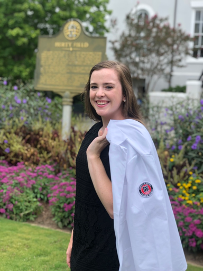 My role in the clinic was more than observational. Instead. I got to interact with patients in real time and assist in making recommendations for treatment. I learned about this disease state in a hands-on capacity.
My role in the clinic was more than observational. Instead. I got to interact with patients in real time and assist in making recommendations for treatment. I learned about this disease state in a hands-on capacity.
A student who previously took this elective recommended it to me because we have similar interests and goals for after graduation. I wanted to have more exposure to clinical settings and apply my didactic knowledge to actual patients. This patient population had more barriers to care than the patients I see at my retail pharmacy. Although the patients are able to receive the hepatitis C medication through the clinic at no cost, we still had to navigate hurdles that I haven’t previously experienced.
This patient population also faces a huge amount of stigma, making it more difficult to seek out and receive medical care. I learned how to meet people where they are. I got to see how crucial it is for pharmacists to play an active role in the patient care team. I want to create this kind of relationships during my own career and have a positive impact on my patients. Working with healthcare professionals from other disciplines gave me an insight to what the pharmacist’s role truly is. I loved hearing their perspectives and seeing how they approached the same patient in a different way than I did. I really enjoyed working with all of the patients at the clinic, but I was most encouraged by one particular woman. She came into her appointment with several AA chips proudly displayed on her bag. She told us that she was only a few weeks away from a full year of sobriety. She was motivated to complete the hep C medication regimen and improve her health. This woman was working to rebuild her life, and it was really exciting to play a small part of helping her do just that. I really liked how the clinic took care of the whole patient. While they were there for hep C treatment specifically, every ailment or concern was addressed and then followed up on.
Gelina Sani, Third Year PharmD Student, UGA
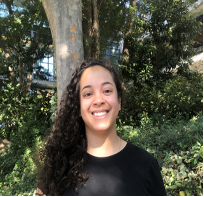 My role at the clinic was to perform rapid HCV tests (at the clinic or at the methadone clinic), determine what therapy patients should be started on, and to counsel patients on HCV medications. Additionally, if HCV patients had any other issues, we were asked what kind of treatments we would recommend. I really wanted to get experience working with this particular population, because they are often an overlooked one in general society. Additionally, we don’t learn much about hepatitis medications and treatment until later in our curriculum, despite there being a large population affected by HCV. There is a lot of potential for pharmacists to be able to help with hepatitis patients in their care. Working closely with Dr. Seagraves in his clinical element was also an amazing opportunity in which I was able to learn things I’ll carry through to my career as a pharmacist.
My role at the clinic was to perform rapid HCV tests (at the clinic or at the methadone clinic), determine what therapy patients should be started on, and to counsel patients on HCV medications. Additionally, if HCV patients had any other issues, we were asked what kind of treatments we would recommend. I really wanted to get experience working with this particular population, because they are often an overlooked one in general society. Additionally, we don’t learn much about hepatitis medications and treatment until later in our curriculum, despite there being a large population affected by HCV. There is a lot of potential for pharmacists to be able to help with hepatitis patients in their care. Working closely with Dr. Seagraves in his clinical element was also an amazing opportunity in which I was able to learn things I’ll carry through to my career as a pharmacist.
This population of patients is very different than what we see in skills labs or even at a retail pharmacy. Aside from being treated for HCV which sets them apart already, they are or have partaken in activities that are high risk for HCV infection (intravenous drug use, sharing needles, unsafe tattooing etc.), and additionally, a very vulnerable population. It was a great experience to talk to these patients, because there is often a stigma against them in society, but it was humbling to realize they get to get judgment free treatment just like any other patients. Along with my medication knowledge, my empathy and communication skills were greatly developed in this elective, and I honestly will remember it for the rest of my career. These were real patients with real stories who needed our help. There was a lot of practical opportunities and experience-related clinical decision-making that I was able to start learning that we don’t learn from multiple choice exams. If I become a preceptor, I would also pass this type of knowledge along. I had the opportunity to work with fellow peers, other pharmacists, a PGY2 resident, social works, nurses, and a PA student. I really enjoyed this part of the elective because we were able to see so many different perspectives of the care of the same patients. I like utilizing everyone’s processes to come up with the process that works for me.
There was a patient that was in the clinic for treatment who was extremely excited for her sobriety and moving out of rehab back to her family. She was showing off the tokens that she earned over the past year and was telling us about the conditions in the rehab center. She was extremely adherent with all of her medications and you could see that her ultimate goal was to get out of rehab and get healthy for her daughter.
Victoria Redshaw, Third Year PharmD Student, UGA
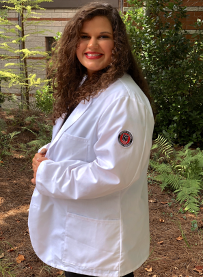 Before heading to Savannah to finish out my third and fourth years in pharmacy school, I was fortunate enough to participate in the Hepatitis Clinic elective. Dr. Seagraves is an exceptional laboratory teacher, and I knew learning from him in a real-clinic setting would be no different. At the clinic, we learned how a person develops hepatitis and about the different medications used to target certain genotypes. We also got the chance to interpret lab reports, screen patients for hep C, and assist in determining the best treatment for each patient. I loved communicating with other healthcare professionals. It was refreshing to hear different perspectives and to all come to an agreement on the most appropriate form of care for the patient. Communication with a team was something I found really helpful because this is something I will continue to do throughout my career in pharmacy.
Before heading to Savannah to finish out my third and fourth years in pharmacy school, I was fortunate enough to participate in the Hepatitis Clinic elective. Dr. Seagraves is an exceptional laboratory teacher, and I knew learning from him in a real-clinic setting would be no different. At the clinic, we learned how a person develops hepatitis and about the different medications used to target certain genotypes. We also got the chance to interpret lab reports, screen patients for hep C, and assist in determining the best treatment for each patient. I loved communicating with other healthcare professionals. It was refreshing to hear different perspectives and to all come to an agreement on the most appropriate form of care for the patient. Communication with a team was something I found really helpful because this is something I will continue to do throughout my career in pharmacy.
A characteristic I loved about the clinic was its welcoming environment. The staff went above and beyond to ensure that each patient felt taken care of. They got to know each individual patient as a person and would be there to answer any questions for them. One patient in particular mentioned that she enjoyed coming to this clinic because she didn’t feel judged. It was nice, yet heartbreaking, to hear. Patients should never be criticized for their lifestyle or choices, which is why I have so much respect for this clinic. To help spread awareness, we traveled to different venues to perform screening tests. It provided people with a convenient way to get tested for hep C while also offering education. If the results were positive, the clinic would follow up with an appointment for treatment. My experience with the clinic was highly valuable and one I will not forget.
These are the stories of a few of the Residents and PharmD students who have worked at the Hepatitis Clinic. It is Dr. Seagraves’ hope that these experiences will bring community awareness to the hepatitis disease state as well as producing pharmacists who are compassionate and zealous caregivers for their patients. Dr. Seagraves hopes that educating the public will lead to more screenings and successful treatment of those infected with viral hepatitis as well as removing any societal stigmas against those infected.


